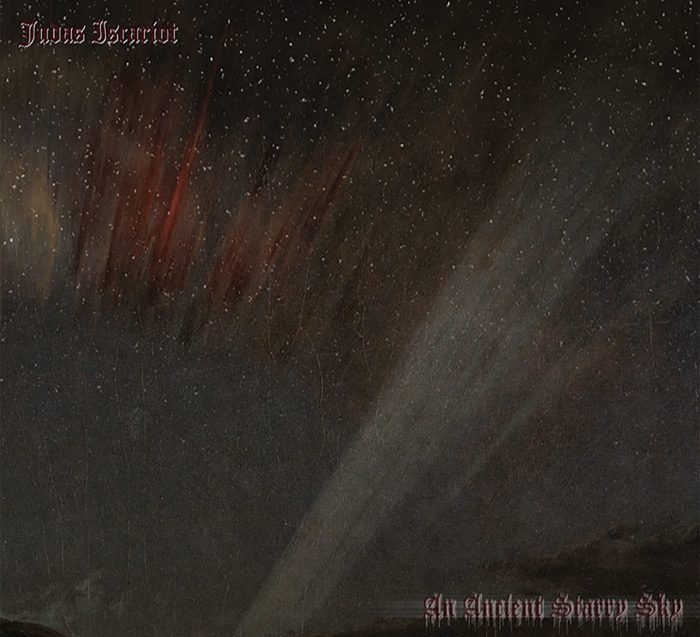
Judas Iscariot is an old and rather “popular” name in the U.S. black metal milieu, however for reasons of ideological reputation rather than for any convincing musical quality. Unfortunately, this has not changed with this comeback proposition, and all efforts to escape its tendency have resulted in conspicuous appropriations from more mainstream genres, perhaps letting through where the composer’s mind is actually at from a musical standpoint. Judas Iscariot suffered of finding an occasional convincing riff, which invariably sounded either generic or an imitation of a more musically focused artist. But being generic in the formulation of riffs in metal is not problem if there is a greater sense of structuration, of narrative or some kind of formulation that lends otherwise simple ideas a greater purpose, as is the case with the music of Blaspherian, to name an outstanding example.
The full release can be divided into two parts, the first being the album proper and the second being a manner of bonus tracks recorded with a thinner but also more raw and pleasing sound. In between these two is an outro that separates them and filling out space without any consequence, as it is merely rumbling and vibration, with little musical effect in context or by itself. Songs are rather long, but there is no proper reason for them to be so. The obvious and undisputed reason is that the extended length should serve as a way for the listener to absorb the music and be submerged in it as in an ethereal stream. We can see this approach in action Hvis Lyset Tar Oss; but there, repetition is not abused, and instead of an insistence on the same idea, we hear variations and progressions on the same idea in a linear structuring that resembles a journey to distant lands. With Judas Iscariot, there is no sense of transportation, but rather airy banter.
The first two tracks, are conspicuous for their utter lack of distinction and personality, a main problem since the project’s earlier days. The first is seven minutes, the usual and proper length for developing ideas in this style: but there is no proper development, only a sequence of irrelevant guitar patterns. The second of the two tracks in this first section, ‘Black Eternal Winds’, is a surprising twelve minutes which, again, do nothing for the composition’s growth or enrichment. Instead, here the longer length serves to illustrate how Judas Iscariot is lacking in any sense of coherence or of black metal style. Judas Iscariot’s is a rock-inspired, depressive black metal that meanders by extending repetitions of a simple riff for up to three minutes, introducing at most two or three other ideas repeated ad nauseam. The result is without any effect other than annoying the listener looking for actual music.
With the second half, comprised of five different tracks, the lack of a “voice” of its own continue, although the songs appear to be slightly more focused, if only by their obsessive return to the same central riff. We find the intrusion of fast rock n’ roll tropes in ‘In Den Qualen Der Hölle’, a half-worked appropriation of the hard rockisms of Inquisition in ‘The Cold Earth’, and in ‘Extinction’ a rather out of place and altogether deplorable cover or imitation of 1980s “hair metal.” In the case of ‘Babylon in Ruin’ one does not know if to trust in its appropriation of Transilvanian Hunger surface traits or be dismissive of its clearly juvenile melodic contours. But the worst of this track is only reached when Judas Iscariot decides to follow that mediocre imitation with an unadultered nu-metal groove that is eventually beached into a Graveland riff. Blunders and meaninglessnes in the present music of Judas Iscariot continue, and many more revolting mediocrities are sure to be found by the listener. If the listener, on the other hand, is looking for the more intense moments showcased by this band as in the track ‘Unholy Victory’, we can easily point out what album it is being lifted from so that the reader can explore the original in its full glory: Xibalba Ah Dzam Poop Ek (1994).
One has to wonder what even those lacking a more developed sense of aesthetics can hear in such an obvious vacuity of content and meaning. For those inclined towards this rather flat and derivative style of black metal (which the author of this review admittedly enjoys in any case), the band Mortum affords a much fuller, consistent and respectable experience. In place of Judas Iscariot An Ancient Starry Sky, the interested listener should direct their attention to Mortum Eheieh Chaos (2017). If more of a justification for this is asked, suffice it to say that, at its best, Judas Iscariot seems to hint at the what Mortum maintains as baseline quality in both craft of riff and awareness of texture and flow in context.
Tags: 2018, an ancient starry sky, Black Metal, judas iscariot


Enslaved’s ‘Yggdrasil’ demo is a great work in structuration.
https://m.youtube.com/watch?v=lQqEMZ00I9E
Wait so is this like a demo comp or something? Either way sounds like a snoozefest. That Xibalba album is great though.
Judas Iscariot is prettty much trance music pkayed on guitars with power chords.
This album was recorded in 1999 and not released (probably because it sucked)
When your dad’s a state justice and you’re a trust fund millionaire, you can buy your place in the USBM Underground
Interesting.
But just to be precise about the music: there is nothing “trance” about this.
It is just very poor and repetive stitching of ideas from indie rock and rock n’ roll;
with some superficial imitation of distinguished black metal propositions by others.